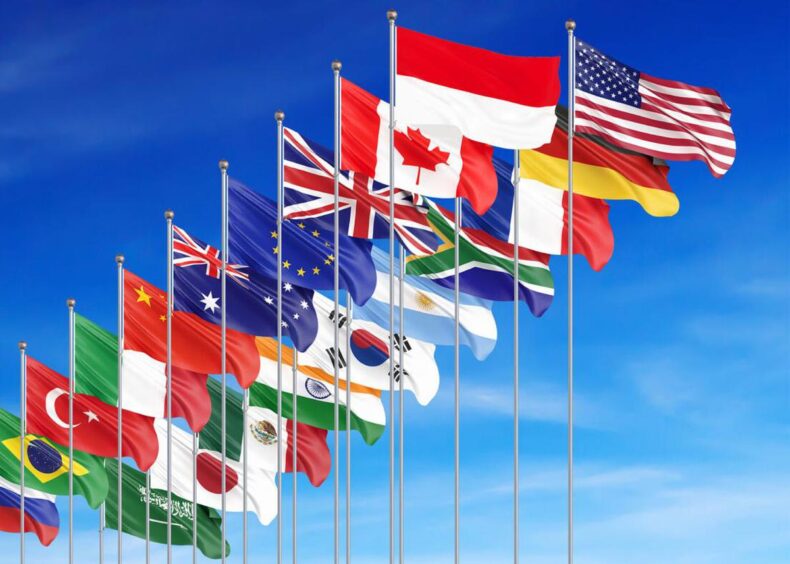For the first time ever, India will host the G-20 summit the following year. The G-20 is an international group made up of 19 nations and the European Union. Since it was a founding member, India has never hosted a G-20 summit but will in the upcoming year. The G-20 is a very significant organisation because it includes:

- 80% of the World’s GDP.
- 75% of International trade.
- 60% of the population.
The main focus area of G-20 is:
- Global Economy.
- International financial stability.
- Climate change mitigation.
- Sustainable development.
The working of G-20 is done in two ways:
- Finance track: focus on monetary and fiscal issues, financial regulations
- Sherpa track: focuses on broader issues such as political engagement, anti-corruption, development, energy.
Why India needs G-20
- To discuss major international issues.
- To bring various partners under one roof.
- Meet important leaders to discuss bilateral issues.
- Put India’s agenda and vision on geo-politics.
- Enhance India’s global value and multilateral participation.
- Meet future aspirations (UNSC seat, WTO reforms).
India needs a forum where it may freely discuss topics like terrorism, climate change, and other challenges. Asia, Africa, America, and even the EU can all be partners with India through the G-20. all under one roof. India has the ability to debate multiple topics at once as well as one topic simultaneously. The leaders of India can meet those of the US, Russia, China, and other countries, among others, and even discuss bilateral concerns. India can talk about border difficulties with China, economic issues with Russia, IPR issues with the US, and other things. India has the ability to set its own goals and objectives in terms of geopolitics. For instance, India favours open trade in the Indo-Pacific area or free and fair trade in the world trade organisation. India can also increase its own global worth by working with leading nations to do so. This can lead to the formation of groups like the Quad Group and the G-20, which can assist India in achieving its international goals, such as a permanent seat on the UN Security Council and WTO changes.
Issues with G-20
- Dominated by developed nations.
- Non-conclusive decision.
- No character- No treaty- No formal structure.
- Partners having contrast news.
- Limited objectives.
- Lack of co-ordination among the partners.
- Remains limited on its success on its economic front.
dominance of rich nations like the US and EU, and whenever they meet, they frequently fail to reach any agreements, leaving the majority of the conversation to be recorded on paper. There are words and speeches, but there is no real consensus or solution. Even its proper headquarters are lacking. Another significant obstacle is the issue of divergent viewpoints in different nations. Because of their animosity toward one another, the partners are unable to work together effectively. Despite experiencing the 1999 Crisis, the 2008 Crisis, and the Recent Economic Crisis due to Covid-19 we have observed that member countries were not synchronised, which has resulted in limited success on the economic front as well.
What should India do in G-20 as a host
- Bring climate change to forefront
- Raise the limited approach on UNSC reforms
- Point on the rise of cross border terrorism
- Open and secure nuclear material trade
- Secure Indo-Pacific region
- Patent/IPR waiver (specially the COVID vaccine)
- Sustainable energy transition
- Collective defence
- WTO reforms
- Developing nations’ more participation in international organisation.
The frequency of urban floods in India, the most recent of which was in Bengaluru, should always be brought to the public’s attention. Additionally, we saw flooding in Pakistan. Floods and droughts have occurred, and India should lead in this area. India should advocate for a modest reform of the UNSC. China has placed restrictions on India’s ability to modify the UNSC, allowing India to exert pressure on other G-20 members to reform the UNSC and add more permanent members. India can discuss the issue of cross-border terrorism with Pakistan as well as the need for safe and open nuclear exchange, but only in accordance with international law. India should advocate for safe and open commerce throughout the Indo-Pacific. India has to improve its intellectual property rights, which it should enjoy like other developing nations and transfer technology to other countries. India should advocate for transitioning to renewable energy sources and global defence. India should make use of the opportunity to increase involvement from poor nations in international organisations like the UNSC, IMF, WTO, etc.
What India should avoid in G-20 as host.
- Chinese aggression
- Russia-Ukraine conflict
- Europe issue
- Quad v/s SCO
- Eastern v/s Western Hemisphere
Since the Chinese aggression is a bilateral problem that should be settled between India and China, India shouldn’t bring it up. If India were to raise the matter on the G20 platform, it might result in criticism and group disagreement on the specific subject. India should refrain from bringing up the Russia-Ukraine crisis or even issues relating to Europe or Europe’s involvement in the Russian-Ukrainian dispute. India shouldn’t compare QUAD and SCO because they have different goals and should refrain from doing so because it is a member of both organisations. Additionally, India shouldn’t debate the Eastern and Western hemispheres because the G20 has members from both hemispheres.Thus hosting G20 is a huge opportunity for India and it should utilise it well.













